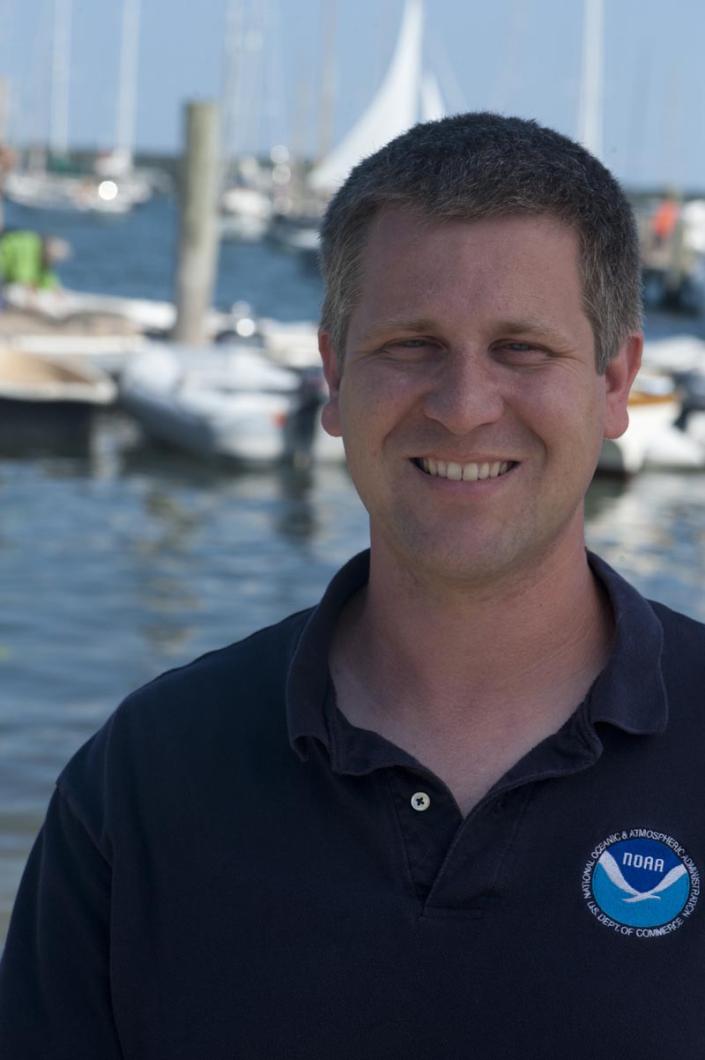Even while he was growing up, Chris Melrose, a scientist for the National Marine Fisheries Service, knew that the currents on the Vineyard were pushing him towards marine science. A 1993 graduate of the Martha’s Vineyard Regional High School, Mr. Melrose is today one of the leading scientists working on a global study of plankton. He works out of the fisheries science center in Narragansett Laboratory in Rhode Island.
Mr. Melrose, 37, leads the Ship of Opportunity Program (SOOP) which utilizes volunteer commercial cargo vessels to monitor the health of plankton populations. A year ago, together with other fellow scientists, he formed the Global Alliance of Continuous Plankton Recorder Surveys in Plymouth, England.
“Plankton are the base of the food chain,” Mr. Melrose said. “They are the foundation to how the whole ecosystem works.”
In the science of managing the fish of the ocean, the shift is towards what the fish eat, the environment they are in and shifting trends. “It is no longer about how many fish are out there,” Mr. Melrose said.
“In the old days, they would look at it under a microscope and count it” he continued. “Though we do that today, there is new level of technology that is taking us forward.”
Watching the movement of plankton and other creatures in the ocean has many similarities to the way meteorologists monitor the weather. It is not one place, it is in many places, and they are using satellites and computers to get a three dimensional moving picture.
“It is a very complicated system. Now with computer modeling, we can take what we know about current, about weather, plankton and fish.”
Mr. Melrose grew up in Oak Bluffs. He took to scuba diving and would often go fishing with his father, Don Melrose. His father died in 1996.
“He got me into scuba diving,” Mr. Melrose said of his father. His mother Pam Melrose, taught at the Oak Bluffs Elementary School.
Mr. Melrose recalls with affection the late Louis R. (Lou) Toscano as an influential regional high school math teacher. “He went above and beyond what was expected as a teacher.” He also recalls how David Donald made chemistry more than interesting. “He got me to think of science like a scientist.”
When Mr. Melrose graduated from high school in 1993, a $4,000 scholarship from the Martha’s Vineyard Striped Bass and Bluefish Derby made a big difference for him as an undergraduate at the Florida Institute of Technology. As a freshman in college, Mr. Melrose studied plankton in the laboratory. During a summer project in his junior year he spent time on the research vessel Delphinus, doing work in Indian River Lagoon, a large shallow water estuary.
“What I like about oceanography is that it is hands on. You aren’t just sitting in a laboratory, you are out on a ship,” he said.
“I went to the University of Rhode Island to do my doctorate in 1998, in biological oceanography,” he continued. “My research focused on phytoplankton productivity in Narragansett Bay.”
Much of his work then pertained to areas in the bay suffering from periodic periods of low oxygen.
“There were times in the summer when there were dead zones, areas where there was no oxygen,” he said.
Mr. Melrose earned his doctorate in 2005 and has continued to work on a monitoring program in the bay. New equipment is available now that allows scientists to tow a sensor, called the Mariner Shuttle, which can be steered from above to explore different depths. The device gives a broader understanding of the level of oxygen at different heights in the water column, as a meteorologist might observe weather patterns at different heights in the atmosphere.
Mr. Melrose’s work is not limited to looking ahead, though.
“Our data sets go back to the 1960s,” he said. “They collected plankton data on commercial ships back then. They couldn’t possibly envision how we would be using their data today, but having that information is invaluable. It allows us to see how the system has changed over time, and allows us to test our models.”
Last December, Mr. Melrose was on one of the last working voyages of the NOAA research vessel Delaware, out of Woods Hole. They visited Georges Bank and the Gulf of Maine. Last month, his work took him to a conference in Paris.
Looking ahead, Mr. Melrose sees himself taking his plankton research offshore for a trip aboard the seven-year-old 209-foot research vessel Henry B. Bigelow.
This is all front-row science, Mr. Melrose said.




Comments
Comment policy »